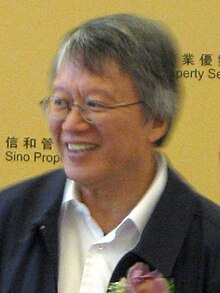
Jasper Tsang Yok-sing is a Hong Kong politician. He is the founding member of the largest pro-Beijing party the Democratic Alliance for the Betterment and Progress of Hong Kong (DAB) from 1992 to 2003 and the 2nd President of the Legislative Council from 2008 to 2016.
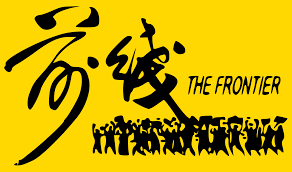
The Frontier was a pro-democracy political group in Hong Kong. It was founded on 26 August 1996 by a group of Legislative Council members and democratic activists headed by Convenor Emily Lau. It was merged into the Democratic Party,the pro-democracy flagship party on 23 November 2008. A new party bearing the same name was established in 2010 by former members who opposed the previous Frontier joining the Democratic Party.

The Democratic Party (DP) is a liberal political party in Hong Kong. Chaired by Lo Kin-hei,it is the flagship party in the pro-democracy camp and currently has no elected representatives in the District Councils.

Emily Lau Wai-hing,JP is a politician in Hong Kong who champions press freedom and human rights. A former journalist,she became the first woman directly elected on the Legislative Council of Hong Kong in the 1991 LegCo elections. She has served as Legislative Councillor for the New Territories East Constituency throughout the 1990s and 2000s until she stepped down in 2016. She was chairperson of the Democratic Party of Hong Kong until 2016.

The Hong Kong Federation of Trade Unions (HKFTU) is a pro-Beijing labour and political group established in 1948 in Hong Kong. It is the oldest and largest labour group in Hong Kong with over 420,000 members in 253 affiliates and associated trade unions. Presided by Ng Chau-pei and chaired by Kingsley Wong,it currently holds four seats in the Legislative Council and 43 seats in the District Councils.
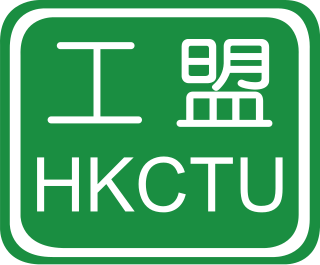
The Hong Kong Confederation of Trade Unions (HKCTU) was a pro-democracy labour and political group in the Hong Kong. It was established on 29 July 1990. It had 160,000 members in 61 affiliates and representation in the Legislative Council of Hong Kong (LegCo) to challenge government policies and push for legal protection of worker and trade union rights. It was one of the two most influential labour groups in Hong Kong,with the other one being the pro-Beijing Hong Kong Federation of Trade Unions.

The United Democrats of Hong Kong was the first political party in Hong Kong. Founded in 1990,the short-lived party was the united front of the liberal democracy forces in preparation of the 1991 first ever direct election for the Legislative Council of Hong Kong. The party won a landslide victory by sweeping 12 of the 18 directly elected seats in the election which shook the political landscape of Hong Kong. In 1994 it was merged with another pro-democracy party Meeting Point to form the contemporary Democratic Party.
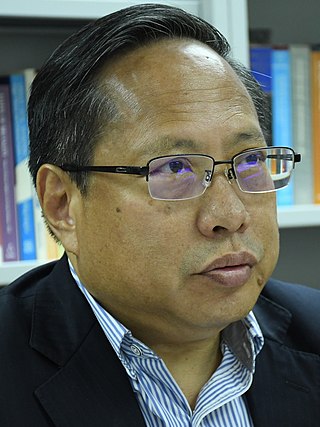
Albert Ho Chun-yan is a solicitor and politician in Hong Kong. He is the former chairman (2014–2019) and vice-chair (2019–2021) of the Hong Kong Alliance in Support of Patriotic Democratic Movements of China,and former chairman of the Democratic Party from 2006 to 2012. He is a solicitor and a former member of the Legislative Council of Hong Kong for District Council (Second) constituency.

Lee Cheuk-yan is a Hong Kong politician and social activist. He was a member of the Legislative Council of Hong Kong from 1995 to 2016,when he lost his seat. He represented the Kowloon West and the Manufacturing constituencies briefly in 1995 and had been representing the New Territories West constituency from 1998 to 2016. He is a former trade union leader,former General Secretary of the Hong Kong Confederation of Trade Unions,as well as former chairman of the Hong Kong Alliance in Support of Patriotic Democratic Movements of China. He has been jailed since April 2021 for his role in the Hong Kong anti-extradition bill protests,having been sentenced for organizing two unauthorized assemblies;for an alleged offence of subversion of the state,no trial date has been set as of February 2024.

The Kowloon West geographical constituency was one of the five geographical constituencies of the Legislative Council of Hong Kong from 1998 to 2021. It was established in 1998 for the first SAR Legislative Council election and was abolished under the 2021 overhaul of the Hong Kong electoral system. In the 2016 Legislative Council election,it elected six members of the Legislative Council using the Hare quota of party-list proportional representation. It had 602,733 registered electorates in 2020. The constituency corresponded to the districts of Yau Tsim Mong,Sham Shui Po,and Kowloon City.

The pro-democracy camp,also known as the pan-democracy camp,is a political alignment in Hong Kong that supports increased democracy,namely the universal suffrage of the Chief Executive and the Legislative Council as given by the Basic Law under the "One Country,Two Systems" framework.

The 2000 Hong Kong Legislative Council election was held on 10 September 2000 for members of the 2nd Legislative Council (LegCo) of the Hong Kong Special Administrative Region (HKSAR). The election returned 24 members from directly elected geographical constituencies,6 seats from the Election Committee constituency and 30 members from functional constituencies,of which 9 uncontested.

The 1991 Hong Kong Legislative Council election was held for members of the Legislative Council of Hong Kong (LegCo). The election of the members of functional constituencies was held on 12 September 1991 and the election of geographical constituency seats was held on 15 September respectively. It was the first ever direct election of the Legislative Council in Hong Kong history. There were 18 members from directly elected geographical constituencies,21 members from functional constituencies,17 members appointed by the Governor,and 3 official members.

Hong Kong Autonomy Movement,sometimes known as the Hong Kong City State Autonomous Movement,is a movement formed in Hong Kong amidst the raising awareness about Hong Kong's constitutional rights of high autonomy,free from interference of PRC government,as stipulated in Hong Kong Basic Law Article 2 and Article 22.
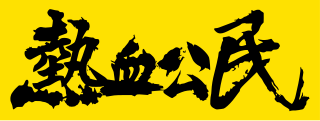
Civic Passion was a radical,populist,localist,and nativist political party in Hong Kong. Founded by Wong Yeung-tat as an activist group in 2012,it held strong localist views and opposed the involvement of the Chinese government in the governance of Hong Kong. In the 2016 Legislative Council election,the Civic Passion formed an electoral alliance with Wong Yuk-man's Proletariat Political Institute and Chin Wan's Hong Kong Resurgence Order. Cheng Chung-tai became the only candidate of the alliance elected to the legislature and subsequently took over as the leader of the Civic Passion. After the election,Cheng reorganised the group into a political party and pulled out from the social activism. From December 2020 to August 2021,it was the only opposition party in the Legislative Council of Hong Kong.
Liberalism in Hong Kong has become the driving force of the democratic movement since the 1980s which is mainly represented by the pro-democracy camp which strives for the universal suffrage,human rights and rule of law in Hong Kong. It is one of two major political ideologies of the Hong Kong,with the other being conservatism. The emergence of the contemporary liberalism took root in the rapid democratisation in the final years of the colonial years in the 1980s and 1990s,which the pro-democracy camp was united under the banner of an autonomous Hong Kong under Chinese sovereignty. The liberals consolidated their popular support from the 1989 Tiananmen Square protests and massacre and received landslide victories in the first direct elections in 1991 and 1995 in the final colonial years. The liberals took the defensive role against the Beijing's authoritarian regime going into the early SAR period which led to the massive demonstration against the Basic Law Article 23 in 2003.

In Hong Kong,localism is a political movement centred on the preservation of the city's autonomy and local culture. The Hong Kong localist movement encompasses a variety of groups with different goals,but all of them oppose the perceived growing encroachment of the Chinese central government on the city's management of its own political,economic,and social affairs. While the movement's milder elements advocate for greater autonomy while remaining as part of China,the more radical elements call for a return to British rule or full independence as a sovereign state. Some also advocate for a more aggressive and militant stance against the mainland government in defending local interests. For that reason,they are labelled as "radicals" and "separatists" by the Chinese government. Issues of concern to the localist camp include land use and development,cultural and heritage conservation,parallel trading,and the increasing number of mainland immigrants and mainland tourists. Although grouped together with liberals,they have a distinct view as they advocate for Hongkongers' right to self-determination. In the aftermath of the 2019–2020 Hong Kong protests,localists were largely absorbed into the pro-democracy camp.
Socialism in Hong Kong is a political trend taking root from Marxism and Leninism which was introduced to Hong Kong in the early 1920s. Ever since the Chinese Communist Party adopted economic reforms from 1978,young socialists have moved towards the pro-democracy camp under the banner of social democracy while traditional leftists remain in the pro-Beijing camp.

Localist camp or localist and self-determination groups refers to the various groups with localist ideologies in Hong Kong. It emerged from post-80s social movements in the late 2000s which centred on the preservation of the city's autonomy and local lifestyles and opposed the perceived growing encroachment of the Chinese government on the city's management of its own political,economic,and social affairs.

The 2021 Hong Kong Legislative Council election was a general election held on 19 December 2021 for the 7th Legislative Council of Hong Kong. Under the drastic Beijing-imposed electoral overhaul,the total number of seats was increased from 70 to 90 seats,with the directly elected geographical constituencies (GCs) reduced from 35 to 20 seats,the trade-based indirectly elected functional constituencies (FCs) staying at 30,and the additional 40 seats being elected by the 1,500-member Election Committee. therefore still not allowing universal suffrage.
